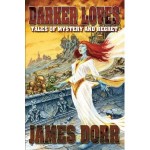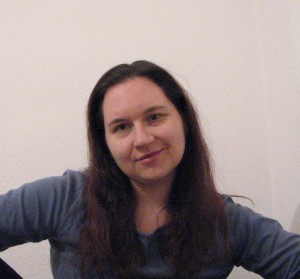Posts Tagged ‘Amber Stults’
Niteblade Contributor Interview with Elissa Malcohn
Elissa Malcohn’s award-winning fiction, nonfiction, and poetry have appeared in dozens of publications from the 1970s on. If you haven’t stopped by Malcohn’s World you should if for no other reason than to read her great collection of rejection letters.
When did you first recognize yourself as a writer?
I was in grade school. When I graduated, PS 99 in Brooklyn ordered two English medals, renamed one its first Creative Writing medal, and gave it to me. I was already writing my first speculative fiction stories. I was also one of two people in my graduating class to win a Read Magazine Creative Writing Award.
What draws you to speculative fiction?
The literature of mythology (especially the retelling of Greek myths by Bernard Evslin, Dorothy Evslin, and Ned Hoopes) drew me in when I was a child. So did television programs like Star Trek and movies animated by Ray Harryhausen. I first read SF when I was nine, but was galvanized by anthologies about three years later and was weaned on the New Wave subgenre. (Peter Graham’s adage, “The golden age of science fiction is twelve,” literally applies to me.) For me, speculative fiction is away to plumb the human psyche and soul through the stealth of metaphor.
Is there a piece of writing advice you’ve never followed?
That one should never submit to a non-paying market. I take everything on a case-by-case basis.
In the June 2010 issue of Niteblade, Rhonda chose to publish your story, “Icarus Redux“. Is there a story behind how it came about?
I initially wrote “Icarus Redux” in response to a submissions call from a horror anthology that never got off the ground. The call had specified flash fiction, so I cast about for a story arc that would fit. Part of my inspiration may have come from a severed cardinal’s head that had turned up in my yard not long before. I suspect a great horned owl was the culprit there.
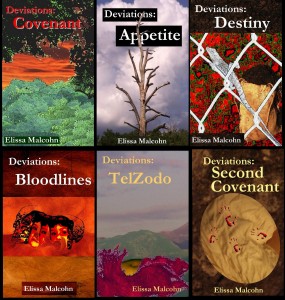
What have you been working on lately?
I recently released Second Covenant, the sixth and final installment of my Deviations series (available for free download through my website, http://home.earthlink.net/~deviations). I’m working on a “behind the scenes” supplement to the saga, along with some shorter pieces.
Is there anything else you’d like to share with Niteblade’s readers?
My personal mantra is, “Nothing is wasted.” I apply that to everything, from the crap I write while trying to get a scene right, to life in general.
Niteblade Contributor Interview with James S. Dorr
James S. Dorr’s poetry has appeared in Niteblade several times. Here’s an interview which will let you get to know him a bit better.
When did you first recognize yourself as a writer?
It’s hard to say. My original interest even by the time I had entered college was in visual arts. I was a cartoonist/illustrator on the humor magazine (eventually becoming art editor), I designed posters, I even did set design for the campus “little theatre.” However I also did some utility writing on the humor magazine, as well as being exposed to writing as an illlustrator on the literary magazine staff, and then when the Science Fiction club started a fanzine (think amateur ezine, but done with mimeograph on paper) I both illustrated and wrote generally humorous sf/fantasy parodies. By grad school I’d turned more to the writing end, doing a weekly science/humor column, for instance, which led to editorial work (albeit still doing occasional article illustrations), and then to a paying gig as a technical writer (which also involved editorial work), so I suppose it happened somewhere in there. Eventually I left technical writing, freelancing real estate and business/consumer articles, and then got a more mundane flunkey job which freed me to go back to “creative” writing including poetry — which is probably more or less where I am now. So I’d have to say it was more a process, or a “coming to realize over time” than an actual sudden revelation.
What draws you to speculative fiction?
Imagination, I think. I like to think of impossible things before breakfast — except that my imagination isn’t that good. Thinking up story or poetry ideas is a struggle for me, but as a kid I loved reading science fiction, then later fantasy via, at first, The Lord of the Rings, and through it all horror via the Modern Library Giant edition of The Complete Tales and Poems of Edgar Allan Poe (with tiny type that grows harder to read, but it’s still on my bookshelf!) and Ray Bradbury’s The October Country, etc., drawing on others’ imaginations to feed my own. Then, as I was moving away from freelance nonfiction work, I also made it a point to experiment with fiction writing myself, to learn the differences in the mechanics of writing to entertain rather than teach, for instance, so while I still have trouble with ideas, I now go to nonfiction — history, biography, travel, science — to find things I can use to put into stories.
Is there a piece of writing advice you’ve never followed?
“Always write at least a little every day.” Or, “write at least a set amount every day,” or “an hour every day,” or . . . you get the idea. But that’s the sort of thing I did for work, and creativity, I think, has to be a form of play. Even working, my best moments came when I had the flexibility to make my own schedules — I might have to write to a specific deadline, but when I got started was still my decision. So, while I can see the sense of the advice, especially for someone starting into writing cold — think of it then like practicing a musical instrument (and, yes, I play music too, as tenor in a Renaissance recorder consort that I also lead) — I myself am too undisciplined to follow it seriously. Rather, I like things to be open ended, preferring not to start a new story, for instance, unless I have at least a four-hour block free ahead of me. While on other days I might not write at all, but there are other things that need to be done too like submitting work, or contacting editors, or proofing galleys, which might be less fun but may also free up my unconscious mind to be ready when, maybe the next day, meybe next Saturday, I do find time to sit down and start writing.
In the March 2010 issue of Niteblade, Rhonda chose to publish your poem, “Second Chance“. Is there a story behind how it came about?
“Second Chance” was itself a second chance in its way. I had sent Rhonda a group of poems including two haiku-styled pieces about killer snowmen. But then I discovered one of the two had already been sent to another market, so I re-sent the others with an apology and explanation, offering “Second Chance” as a substitute for the poem I was withdrawing. So these things happen. But then a week later I got an email with an apology of sorts from Rhonda saying she wanted to use both “Second Chance” and the second snowman poem, “Winter Wonder (2),” but wanted to hold “Winter Wonder (2)” until the December 2010 issue. And so both were published, though at different times.
But there’s a second story too. “Second Chance” was inspired by a movie with Bela Lugosi, The Return of the Vampire, in which a “staked” vampire is unearthed in a World War II London cemetery after a bomb hit during the Blitz. A clean up crew, assuming the stake is a shard from the bomb, pull it out and rebury the now “undesecrated” body, and so the fun begins. I’d like to add that “Second Chance” has been reprinted in Vamps (A Retrospective), my just-published book of vampiric poetry (of which more in a moment), but it happens, almost by accident, that it’s not — simply a case of there being too many shorter poems to choose from, so some had to be left out. However another poem from Niteblade, “High-Flying” from September 2007, does appear there.
- James S. Dorr
- Vamps Front Cover
- Vamps Full Cover
- Strange Mistresses
- Darker Loves
What have you been working on lately?
The immediate news is I’ve just published a book of poetry on vampires, Vamps (A Retrospective). Illustrated by artist and poet and fellow Niteblade contributor Marge Simon, it’s just come out as an August release in trade paperback from Sam’s Dot Publishing, and for only about the cost of a small pizza — well, depending on toppings and local variations — which makes it a bargain even if you just get it for the pictures. “Pimpage” aside, it has seventy-five poems of varying lengths, about a third of which are unpublished, looking at the vampire myth through various “characters” (Annchuck, Melissa, the gods of Ancient Greece, jazz fans, baseball nuts, Nikki, “Medusa,” victims and lovers, a vamp from the future. . . ) and from a variety of different angles. Also just out is Vanitas, an electronic chapbook from Untreed Reads Publishing of a story combining mystery, gothic romance, and steam that originally appeared in Alfred Hitchcock’s Mystery Magazine.
Looking ahead, I’ve been working on a novel based on a series of stories set in the “Tombs,” a vast necropolis and its environs on a far-future dying Earth, about a dozen of which have already been published in various places. This would be structured somewhat like Bradbury’s The Martian Chronicles or Christopher Barzak’s The Love We Share Without Knowing in that individual stories could still stand alone, but combined add up to a larger picture. Also, partly as a response to a weak economy, I’ve been pushing to republish earlier stories in various anthologies which, if not the highest paying, still add up — as well as getting work of mine back into circulation — along with writing new stories and poems.
Is there anything else you’d like to share with Niteblade’s readers?
Along with Vamps (A Retrospective), I have two collections of fiction and poetry, Strange Mistresses: Tales of Wonder and Romance and Darker Loves: Tales of Mystery and Regret, available from Dark Regions Press; a long out-of-print poetry chapbook Towers of Darkness (the origin of several of the characters in Vamps) originally published by Nocturnal Publications; and several hundred individual publications from Aboriginal Science Fiction and Alfred Hitchcock’s to Xenophilia and The Yellow Bat Review. For further news about me and my doings including new sales and reprints — and links to publishers for my books — along with occasional sample stories and poems, movies I’ve watched, bibliographic information, and maybe a note or two on my cat Wednesday, I invite readers to check out my site, and have a look around. Comments are always welcome.
Niteblade Contributor Interview with John Hayes
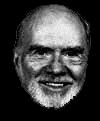 John Hayes is a multidisciplanary artist. He sculpts and writes poems.
John Hayes is a multidisciplanary artist. He sculpts and writes poems.
When did you first recognize yourself as a writer?
As an undergraduate, I knew I was a writer. My first attempt to publish was a science fiction story to The New Yorker. Rejection was rapid. I decided the world was not ready for my genius and took a job writing manuals. The pay was good. Now I’m writing poems, short plays and fiction and have about thirty published each year. Several years ago I found the sci-fi story that The New Yorker rejected yellowing in a drawer. I rewrote and Gothic Light published.
What draws you to speculative fiction?
Speculative fiction is an exciting world with room for the new. The rules are loose and allow the imagination to soar.
Is there a piece of writing advice you’ve never followed?
If I only wrote what I knew, I’d never write anything.
In the September 2007 issue of Niteblade, Rhonda chose to publish your poem, “Unrequited Love”. Is there a story behind how it came about?
At times I feel like my life has been a series of unrequited loves. I’m still looking for someone with a few vampire genes.
What have you been working on lately?
A bout with bladder cancer slowed me down but I’ve started to rewrite some social justice poems. I’ve turned two of my recurring nightmares into horror poems and had three children poems published.
Is there anything else you’d like to share with Niteblade’s readers?
Keep reading.
When I give poetry readings I tell the audience my search for fame, fortune and great sex
brought me to poetry. I’m still waiting for all three but have learned the best
way to get published is to rewrite, accept rejection, keep sending and follow
the guidelines. The publisher sets the rules, not the writer.
Interview with Daniel Polansky
Daniel Polansky’s debut novel, Low Town, is released into the wilds today. While prepping for the big day, he was kind enough to take a few moments out of his busy schedule to answer a few questions from Niteblade.
Here’s the information from Doubleday’s site to introduce you to Low Town.
Drug dealers, hustlers, brothels, dirty politics, corrupt cops . . . and sorcery. Welcome to Low Town.
In the forgotten back alleys and flophouses that lie in the shadows of Rigus, the finest city of the Thirteen Lands, you will find Low Town. It is an ugly place, and its champion is an ugly man. Disgraced intelligence agent. Forgotten war hero. Independent drug dealer. After a fall from grace five years ago, a man known as the Warden leads a life of crime, addicted to cheap violence and expensive drugs. Every day is a constant hustle to find new customers and protect his turf from low-life competition like Tancred the Harelip and Ling Chi, the enigmatic crime lord of the heathens.
The Warden’s life of drugged iniquity is shaken by his discovery of a murdered child down a dead-end street . . . setting him on a collision course with the life he left behind. As a former agent with Black House—the secret police—he knows better than anyone that murder in Low Town is an everyday thing, the kind of crime that doesn’t get investigated. To protect his home, he will take part in a dangerous game of deception between underworld bosses and the psychotic head of Black House, but the truth is far darker than he imagines. In Low Town, no one can be trusted.
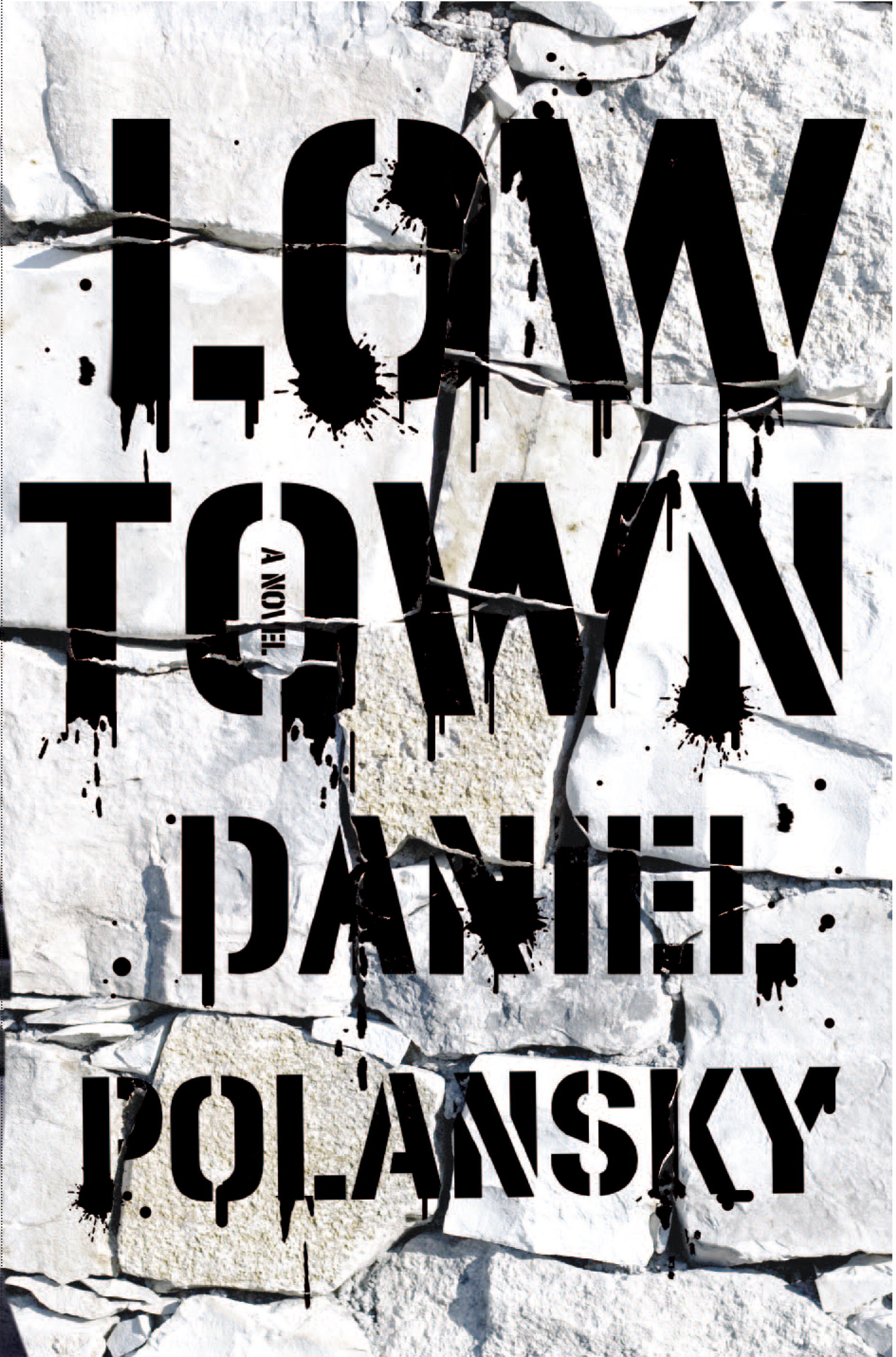
Which came first – the agent or the book deal?
Like most writers, I got an agent first — the fantastic Chris Kepner, tip of the hat and so on.
The UK edition is titled The Straight Razor Cure and will be published concurrently with the US edition. Why is the title different?
In short, because Doubleday, my US publisher, asked me to change it after they bought the book, and I was pretty giddy with the whole ‘being a published author’ thing, and not in the mood to quibble.
Your novel will be published in multiple languages. Will you handle any of the translations yourself?
Would that I could! But if you had any idea of how inept a student of foreign languages I am, you would know the answer to that question already.
Low Town is your first published novel. How long did it take to write?
It’s a little hard to say — it took me about four months to get a rough draft down, but it was about a year and a half between penning the first word and getting a book deal. Of course, a lot of that time was spent trying to get an agent and so on.
What was the most interesting part of writing Low Town? Discovering the story or the characters?
They kind of came concurrently.
Do you have any other books in the works related to the Thirteen Lands?
I’m working on a sequel at the moment, though it’s sadly still untitled. All goes well it should be coming out in Summer of 2012.
Is there anything else you’d like to share with Niteblade’s readers?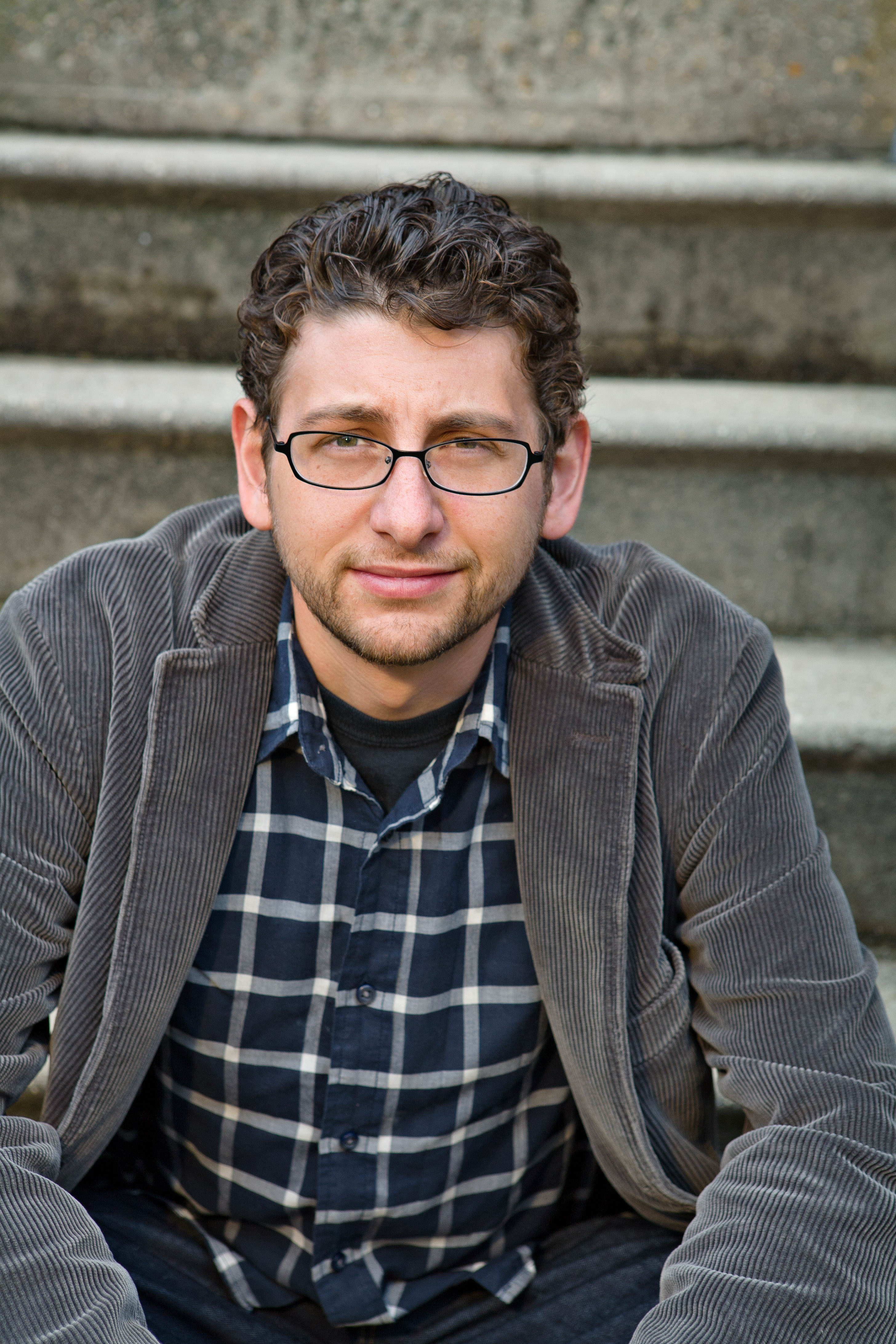
Only that I hope they enjoy the book. Actually, I mainly just hope they buy the book. Enjoying the book would be icing. I have a Facebook page that’s updated pretty regularly, on Twitter I’m @DanielPolansky, and you can find me on GoodReads if you look hard enough. First 7 chapters, mailing list, etc. at DanielPolansky.com. Appreciate your time.
Niteblade Contributor Interview with David Wright
David Wright’s work appeared in Niteblade in 2010. He allowed me to interview him this summer.
When did you first recognize yourself as a writer?
After I saw the movie Star Wars, I became irrepressibly obsessed with the notion of becoming a writer, director, producer, music composer…I’m not sure which. I was only 10 years old. But I knew I wanted to make something like that. I didn’t know how to do that, but that’s what I wanted to do. And if I had to become a writer to do it, then that’s what was going to do.
What draws you to speculative fiction?
I don’t think I heard the term ‘speculative fiction’ until I was in my twenties. In my youth, there were only two genres that interested me—fantasy and science fiction—and they were both found in equal parts in the countless Fantasy and Science Fiction magazines that lined my father’s bookshelves. Ogling those flashy covers with their magical promise of mind blowing ideas was the catalyst for a life-long love of that nebulous genre we now call ‘speculative fiction.’
Is there a piece of writing advice you’ve never followed?
“Write about what you know.” I’ve always both loved and hated this piece of advice. If we all wrote about what we knew, there would be no fantasy or science fiction. What would be the fun in that? So let me turn the idiom on its head. Know about what you write. Know the characters, the setting, the world you’ve created better than you know the real world. And then write about it. Now that’s a piece of advice I can stand behind.
In the December 2010 issue of Niteblade, Rhonda chose to publish your story, “Climax Speciation“. Is there a story behind how it came about?
There is nothing more terrifying in life than the birth of your own children–not the actual biological birth, although that’s pretty terrifying, but the effect it has on your own psychology. You are no longer the center of the universe, or even the protagonist of your own personal story. For a brief moment, at least, you glimpse the idea that another soul has entered into existence, and the force of their potential life is staggering. Will they be good or bad? Will they cure cancer or drop a bomb so powerful that it will wipe out all of humanity? That fear may have been the impetus for my story, but I’m not really sure. I wasn’t getting a lot of sleep back then.
What have you been working on lately?
I still write the occasional short story, but my main concern of late is finishing my third novel, Glaive Lord. This is my first foray into the classic genre of sword and sorcery, and I have to admit that I am loving it.
Is there anything else you’d like to share with Niteblade’s readers?
I know a lot of Niteblade’s readers are just like me—budding writers who’d like to make it big someday. But I’ve been budding for a long time. I’m not rich. I’m not famous. I may not even be that good. But I have no regrets. I write because I love it, and there’s no better reason than that.
Niteblade Contributor Interview With Brian Rosenberger
Brian Rosenberger poems have been published in several anthologies and books. Visit him on the web at http://home.earthlink.net/~brosenberger/.
When did you first recognize yourself as a poet?
In my early twenties, I began writing poetry. These early efforts were influenced by Charles Bukowski and Henry Rollins. I’m still big fans of both. I also really enjoyed the work of Charles Baudelaire. Being a teenager in the 80’s, I was also a big heavy metal fan, drawn equally to the music as well as the lyrics. Bands like Iron Maiden, Slayer, Testament, Metallica, Antrax, Black Sabbath were also influences.
What draws you to speculative poetry?
I grew up on monster movies and horror films. I’ve always learned more to the darker side of fantasy. While I enjoy sword and sorcery and space opera, horror is ingrained in my DNA. I use to publish a poetry ezine called Decompositions and published a lot of well known and lesser known spec poets. That was really the jumpstart for me writing speculative poetry.
Is there a piece of writing advice you’ve never followed?
Most likely but nothing I recall specifically. The best piece of advice is the old adage, a writer writes. That has considerable weight. If you’re not putting in the time, you’re not going to yield results.
In the June 2010 issue of Niteblade, Rhonda chose to publish your poem, “Flea Market Zombies”. It was also the inspiration for the cover that month. Is there a story behind the poem?
As a kid in Smalltown, IN, I always enjoyed exploring our local flea market which was affectionately called the Sale Barn. I was usually hunting for comic books but it was always fun to rummage through the various vendors’ wares. One person could be selling socks, fruits and vegetables, roach clips, bootleg cassettes, ninja stars, rabbits, and fishing lures all out of the same van. It was a fun time. “Flea Market Zombies” was drawn from those memories.
What have you been working on lately?
No big projects. Real life has intervened as it sometimes does so writing as been on the backburner the past few months. I had three books released last year, a collection of short stories (As the Worm Turns) and two poetry collections (Scream For Me and And For My Next Trick). Once things stabilize on a personal level, I hope to resume pen to paper. In the meantime, my “Ideas” folder continues to grow. A writer writes after all.
Is there anything else you’d like to share with Niteblade’s readers?
Thanks for the opportunity for the interview. I have work forthcoming (hopefully) in Terror of Miskatonic Falls, Ruby Red Cravings, Splatterpunk is Not Dead!, and a variety of other places.
See you in the shadows.
Niteblade Contributor Interview with Aaron Polson
Aaron Polson has been published several times in Niteblade. He was kind enough to take time out of his summer schedule to answer a few questions. You can visit him online at www.aaronpolson.net for regular updates.
When did you first recognize yourself as a writer?
Only recently—within the past six months or so—was I able to look in the mirror and say, “Yes, I’m a writer.” I’ve been writing for a number of years, but it just didn’t seem like I was there yet. I’m not sure what tipped the scales. Writing is just something I do every day now (or most every day). It’s become part of who I am, just as much as teacher, father, and husband.
What draws you to speculative fiction?
I’m sure it’s some Freudian need to explain the world and meaning of my existence and all that. Personally, I find speculative fiction fun. A writer can break the rules of “reality” in a speculative story—break the rules of reality and create his or her own rules. It’s a little like playing God with a lot fewer consequences.
Is there a piece of writing advice you’ve never followed?
“Write Every Day”
While I feel it is vital to keep writing, there are some days I have to just stay away from the keyboard. I’ve become better at recognizing those days. Sometimes I just need to take a break because I feel everything I write is terrible. I’m currently involved in a fairly sizeable home renovation project (it’s what teachers do during summer “break”). I’ve only written about a thousand words this week, but I’m still trying.
In the December 2008 issue of Niteblade, Rhonda chose to publish your story, “Bait Worms”. Is there a story behind how it came about?
My hometown influenced “Bait Worms” like it has with a number of my stories. An old house down the street from my best friend’s place inspired the piece. I tried to imagine what kind of person lived in the house before it was abandoned. My brain tends to think in horror stories, so it went to a dark place. We spent a good deal of time fishing as kids, and digging worms from our neighbors’ gardens was a pretty typical pastime. It all sort of fell into place after that.
What have you been working on lately?
I’ve continued to write short stories, but I’m currently working on longer works. One is a MG novel, Raygun, involving an enchanted toy “space gun”. My wife challenged me to write something Owen, our seven-year-old son, could read. In Raygun, the protagonist, a young boy, finds a stash of his grandfather’s old tin toys—a good, old-fashioned science-fantasy romp ensues. The other piece is a supernatural thriller involving ghosts and a form of time travel. I’m sworn to secrecy on the rest.
Is there anything else you’d like to share with Niteblade’s readers?
Stop by my website, www.aaronpolson.net, for free stories, podcasts, or just to chat.
Thanks for the interview!
Niteblade Contributor Interview with Holly Day
Holly has been writing for publication for 22 years with poetry, fiction, and nonfiction published in over 3,000 magazines and ezines internationally, including The Oxford American, Palace Corbie, XLR8R, Guitar One, Boiled Angel, Rollerderby, and, of course, Niteblade. Her published books are Music Theory for Dummies, Music Composition for Dummies, Shakira, Guitar All-in-One for Dummies, Walking Twin Cities, Insider’s Guide to the Twin Cities, and numerous photocopied poetry chapbooks.
When did you first recognize yourself as a poet?
Oh, gosh—I’m not sure I recognize myself as a poet now! Even after having around 3,000 poems published in small and mainstream magazines over the past 25 years, I still don’t feel worthy of that title. I do remember the first “critically-acclaimed” poem I wrote, though. It was in second grade, and we had to write a poem for Groundhog’s Day. The groundhog in my poem died a terrible, frozen death, and the poem was so over-the-top graphic all the cute boys in class kept going back to the wall it was hanging from to read it. I guess maybe, in the back of my head, I still write poetry for all the cute boys out there.
What draws you to speculative poetry?
I don’t like reality much. I mean, I like parts of it, like my kids and my husband and all the nature bits, and oh, all the quiet, old, crumbling abandoned buildings, but most of my adult life has been about finding a way to stay as isolated from the “real world” as possible—hence, my career as a freelance art critic/music journalist. When I write, I try to pull together all the extraordinary possibilities out of the events I’m writing about as much as possible. Somehow it translates into speculative poetry. So far as why I like reading it, it’s because I’m secretly still a thirteen-year-old dork who wants to be romanced by a tall, dark alien in a flying saucer.
Is there a piece of writing advice you’ve never followed?
I had a lot of professors in college tell me to skip sending my writing to the small press and save my best work for large publications. While I’ve been in plenty of mainstream glossies, I still love to see my work in small press publications. I started writing for publication when I was 15 (and I’m turning 40 in June!), and I’ve literally grown up thinking of many of the small press writers and editors out there as my friends and family. If I hadn’t started out in the small press, and felt that particular brand of love and support throughout my writing career, I’m not sure I would have made it to adulthood.
In the September 2009 issue of Niteblade, Rhonda chose to publish your poem, “Free Fall”. Is there a story behind how the poem came about?
Short answer: reading post-9/11 headlines. Another short answer, weird but true: I dream of falling and exploding at least once a month.
What have you been working on lately?
Finishing up the second edition of my book, Music Theory for Dummies, and a nonfiction book about being a small press poet in the 80’s and 90’s.
Is there anything else you’d like to share with Niteblade’s readers?
My husband is an awful gardener! He was outside in the yard this morning, allegedly helping me with the garden, and he managed to bend and completely destroy about half a dozen of my specialty irises! This might not mean anything to people outside of Minnesota, but in this state, spring gardens are sacrosanct. I waited two whole years to see those things bloom, and now I have to wait another 12 months.
Other than that, I got a blog about small press poetry up at http://hollydayonwriting.blogspot.com/.
Niteblade Contributor Interview With Alexandra Seidel
Today’s Niteblade Contributor interview is with Alexandra Seidel. You may recognize her name – Rhonda announced last week she’s the new poetry co-editor of Niteblade. This interview was planned before the announcement. 🙂
When did you first recognize yourself as a poet?
Even when I had my first few poems published, I wouldn’t have spoken of myself as a poet, not with any confidence in my talent as a poet at any rate. But at some point, I was able to write a good poem, know it to be a good poem and have it accepted by great markets right away. That was about the time when I would have told you that I’m a real poet, meaning every word of it.
What draws you to speculative poetry?
I have always loved reading spec fiction, but strangely, my first few publications are more literary/mainstream. I think in retrospect, I did that to actually get something published, I just had no idea what the real world of writing looks like. I gradually moved to spec fiction and poetry. I like the people who work in this field, so that is certainly one thing that draws me to it. Another is that spec writing is what interests me as a reader, and as a writer, I like the ostensibly limitless possibilities: I can create a world wherever/whenever, consisting of whatever. The whole thing still has to work, and it’s not like I never spent long hours doing research, but tailoring an entire universe, that is a challenge I cannot resist. I also like writing for people who choose to delve into something like that. But really, the first and foremost reason is that I love dreaming.
Is there a piece of writing advice you’ve never followed?
Probably, but since I didn’t follow it, you don’t seriously expect me to remember what it was, do you?
In the March 2010 issue of Niteblade, Rhonda chose to publish your poem, “The Note Found on the Person of the Dead Wizard Skewered From Above”. Is there a story behind how the poem came about?
Well, I think I was tinkering with a story in which there are harpies. That played into the composition of the poem, but if there was anything else more concrete I, err, sort of forgot.
What have you been working on lately?
As far as poetry is concerned, I’m writing a lot of poems about a bunch of Greek/Roman gods that have to do with sleep and dreams, Hypnos, Morpheus, Nix and so on. They just appeal to me, and I thought it would be nice to explore them in verse, in a cycle of poems even. Who knows, I might even write a story or two.
Fiction-wise, there are a couple of things, and then there is life which somehow manages to get in the way more often than I like. I plan on doing some darker stuff soon.
Is there anything else you’d like to share with Niteblade’s readers?
Yes, promotional stuff. First, I’m a slush reader for Niteblade, I read poetry and I read stories, and I like doing this. I would love to read more wow-ingly great stuff, so send that. (My blog has one or two posts that might be interesting for people who want to submit; read: http://tigerinthematchstickbox.blogspot.com/)
Second, I just came on board as the new poetry editor for Fantastique Unfettered. It’s a great mag. Read it. If you write poetry, I want awesome (but note that Niteblade’s tastes are quite different from FU’s).
Third, thanks to anyone who ever read anything of mine! And to Amber, thanks for the interview!
Niteblade Contributor Interview with Beth Cato
Beth Cato‘s stories have appeared in numerous issues of Niteblade. Her work is available in print and online. Beth’s novels are represented by Rebecca Strauss of the McIntosh & Otis Literary Agency.
When did you first recognize yourself as a writer?
When I was four or five years old. I loved books and I made my own at home with scrap paper and staples. However, as an adult I didn’t make a serious commitment until I was 26, stuck at home with a baby, and losing my mind. Writing helped me to find my brain again. Mostly.
What draws you to speculative fiction?
I love the “what if?” element of spec fic. The real world has so many limitations and is often dull. If you bring magic or aliens or the end of the world into the mix, well, you have a different set of challenges to live by.
Is there a piece of writing advice you’ve never followed?
Yes. I avoid advice that I MUST write 1,000 words a day or I MUST write so-and-so. Everyone has their own style and it changes over time. Some days you can make 1,000 words and some days you can be grateful for 50. I had to learn to be flexible and forgive myself for falling short sometimes.
Your work has made several appearances in Niteblade. In the March 2009 issue, Rhonda chose to publish your story, “The Pacifier.” Is there a story behind how it came about?
I read Cormac McCarthy’s book The Road and was haunted by what the book didn’t show. How would a person survive with a baby in a post-apocalyptic environment? What would they resort to in order to stay alive? The trilogy about Jessie and Aaron emerged in those answers.
What have you been working on lately?
I recently acquired a literary agent—and that still boggles my mind—and I’ve spent the past week working on edits. It’s scary and exciting to think of my NaNoWriMo labor of love actually going out on submission to publishers in the next few months.
Is there anything else you’d like to share with Niteblade’s readers?
I can say “Niteblade is awesome,” but I’m probably preaching to the choir. If you want to read my Niteblade stories, you can find links in my bibliography at BethCato.com. Thanks for having me here!




